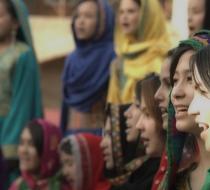#IAmMySong Favorite
In response to a memo from Afghanistan's education ministry, Ahmad Sarmast, the founder of Afghanistan's Institute of Music, began a Twitter campaign with the hashtag #IAmMySong. In response to the hashtag, Afghan girls have taken to Twitter with videos of themselves singing tagged with Sarmast's hashtag and spreading petitions against the ban. The ministry memo banned girls 12 years old and older from singing at school functions. The campaign against the directive has had over 600,000 clicks, according to Haroon Baluch of BytesforAll, a Pakistan-based rights organization that monitors internet traffic.
The memo violates both national and international law, Sarmast said. According to one tweet, 100,000 signatures have been collected throughout several Afghan provinces to protest the directive. Sarmast said he began the #IAmMySong to “let authorities know that the people of Afghanistan oppose this decision and they will stand for the rights of the children, whether boys or girls."
The authorities have since stated that the goal of the memo was to reduce singing groups out of concern for the coronavirus pandemic. They say the memo was a mistake and that its authors had misunderstood the objective.
The controversy comes as women’s rights activists and civil society groups are fighting to ensure that fragile human rights gains made over the last 20 years in Afghanistan — since the U.S.-led invasion ousted the Taliban regime — take center stage in the peace talks underway with the insurgents. It also shows how the rights of girls and women are under threat from conservatives on both sides of the protracted conflict. The memo, a copy of which was seen by The Associated Press, does not mention the pandemic or any health concerns, rather it clearly states that girls older than 12 cannot perform in any public events and that singing at such events is strictly forbidden. It goes on to say that only female teachers can teach music to girls older than 12.
The memo, which went to all school districts in Kabul, was rescinded, said ministry spokeswoman Najiba Arian, insisting that its authors had misunderstood the purpose. A new memo was subsequently sent, saying music groups for both secondary school girls and boys are banned due to coronavirus concerns. After the fiasco of the first memo, a second one went out. It banned both boys and girls older than 12 from singing or performing in public — an even more shocking directive as it takes “the right of choice and freedom of expression away from all students in secondary and high schools,” Sarmast said.
(Source:https://apnews.com/article/afghanistan-media-social-media-coronavirus-pa...)








